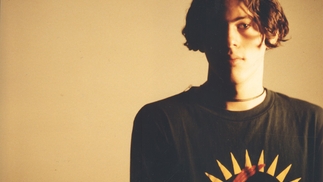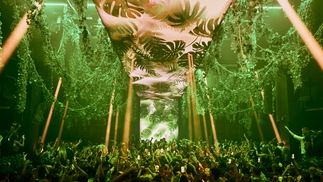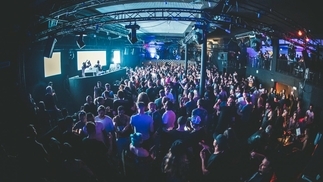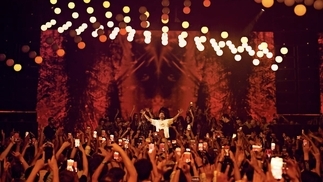Glitter on the dancefloor: DJ Mag Ibiza meets Dimitri From Paris
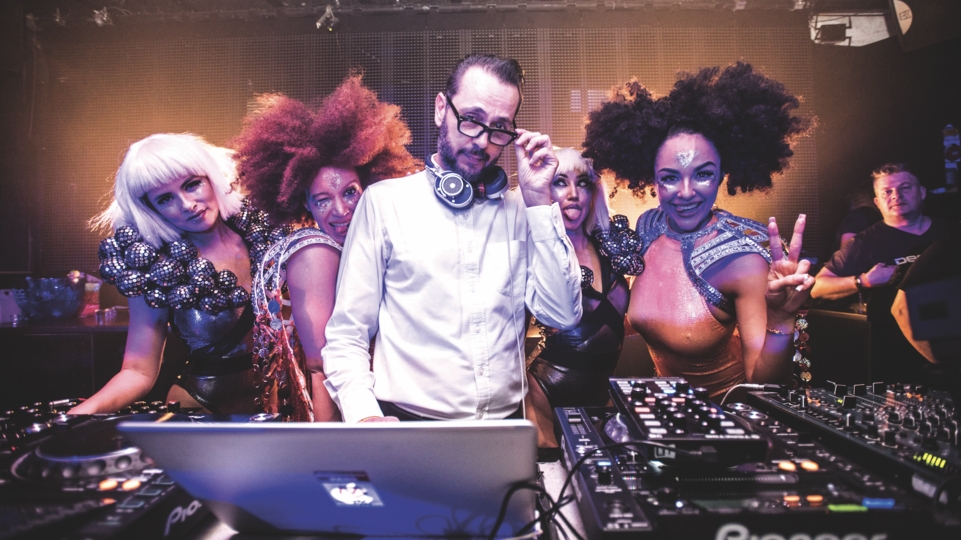
He’s the ultra-chic Parisian DJ with a long-standing penchant for disco, and now Dimitri From Paris is back in Ibiza once again to headline Defected’s Glitterbox residency at Hï Ibiza. DJ Mag meets the dapper Frenchman to find out what it really takes to remix a classic, his take on the great vinyl vs. digital debate, and how to be a legendary disco DJ in 2018...
Honing his legacy as a DJ playing forward-thinking house records on French radio in the ‘80s, Dimitri From Paris has made a name for himself thanks to his expertly crafted edits and remixes, which never stray too far from disco’s live and deeply-musical roots. Most recently, he’s put together a compilation of re-imagined classics titled ‘Le Chic Remixes’ for Defected, which houses reverent reworks of hits from Chic, Sister Sledge, Norman Jean and SB Devotion. His charm and charisma in the booth has also seen him front Glitterbox’s residency on the island over the last few years, alongside fellow disco- and-house-leaning acts like Roger Sanchez, Joey Negro, Groove Armada, Greg Wilson and many more...

You’ve just released a new remix LP with Defected, titled ‘Le Chic Remix’ — was it scary to remix such iconic music?
“With some fear — definitely [laughs]. I mean, I loved the music in the first place and they told me I could only pick four, which was like a genie only giving you three wishes! I wanted to showcase the different sounds of Chic so that’s why I picked some original disco, a Sister Sledge release and more of an ‘80s vibe with ‘I Feel Your Love Coming On’.
“As a DJ and as a collector, I always felt like the music was great for dancing but it wasn’t great for DJs. People would usually have a remix that would come with the 12-inch and that remix might have been done by someone big — Larry Levan, François K, whoever. They were called ‘mix consultants’ and they would produce a version which was better for the dancefloor. So, I wanted to approach these mixes as if I was making this as a remix for vinyl in the ‘70s.
"Every time I approach a remix of an old disco track, I want to make a remix that could have existed but didn’t. I also like to remix stuff that hasn’t been done before, or in some rare cases, a track that I’m not totally happy with the remix. To be honest, it’s very humbling to mix something that’s been approved by the world, and most of them are bona fide hits that don’t need tweaking. What I can do is try and take this music to a generation of younger people who may have heard it on the radio but not so much in the club. The drive was I wanted to have the ability to maybe play this between other house records, and I want it to work. But I do not want to add a big kick-drum, I don’t want to make it house — it’s still disco, but just reinterpreted.”

There’s been a resurgence in the popularity of disco in the last five years — is it too good to last?
“Nothing ever lasts [laughs]! There’s no reason for it to last, as most trends only survive for four or five years. It’s probably on its last legs by now. You’ve never really had a (recent) pop hit that’s been based on disco — maybe something like Mark Ronson, but it’s a loose fit. I was talking with Mark four days ago and he had the same analysis as me about it. I think it’s very hard for people to make disco. If you’re used to making music on a laptop, it’s very hard to make it sound like disco. You could make a disco cut-up, you could sample something and loop it up. And if you’re popular, you have to pay a lot of people for sampling rights! It’s not as easy as making techno record or even a regular pop record.
“We figured that perhaps because it wasn’t so easy, not a lot of people were doing it. So in the absence of a major, crossover hit, a music trend cannot really last. If there was suddenly 10 different people in the charts making disco would probably last longer, but there isn’t even one. It’s really just a club trend — which is good for people like me who know the sound, know what to play. Some DJs try to play disco sets because they like disco — everybody likes a bit of disco — but they go to a club and they’re billed as a disco set and then after three records, it’s not working with the crowd so they go back to playing their regular sound. That’s normal from their point of view because they just need to cater for a crowd and make the party happen, but because they’re not used to playing disco records they don’t know which will work with a crowd and which ones don’t stand a chance. That’s what I think made me successful in the disco trend. I’ve been trying to play disco records to people that didn’t give a fuck about them for over 30 years. I know the ones that will work, and then I just tweak them. I think: ‘OK, this needs to tweaked, changed, extended’ and I actually have been re- editing edits I’ve done 20 years ago to make them work today.”
So do you test new edits out on the floor regularly?
“Well, not every week but I sometimes test an edit for two months until I finally decide that it’s the one. There’s some tunes I’d like to re-edit but then realise it’s not worth an edit because it might not work with the usual crowd I have. I also do everything myself, I make everything, I do the engineering, which grew out of me finding a hard time trying to find people who could do it how I was explaining it to them. That’s how I got into doing it all so I could get [the sound] exactly like I wanted it.”

Is it true that you and Dave Lee (Joey Negro) used to try to out-bid each other for disco records on eBay in the ‘90s...?
“Yes! I think we’re probably the longest running disco DJs outside the disco era. Dave Lee and I had the same path, same age and same generation — we’ve both been DJing for a good 30 years now. We both grew out of the same culture, for sure!”
You’ve been very vocal about the task of the DJ as a music sharer...
“My whole thing with DJing was always to share the music I like. When I started, I thought to myself: I have all this music I’m collecting and I can’t do much with it except listen to it — so I thought a good way to share it would be to DJ!”
Would you ever go back to vinyl?
“Playing only vinyl is something I used to do for 20 years, and it’s not something I’d go back to. When I was younger my dream was to have my music library with me everywhere I went, because every time I was playing I’d think, ‘If only I had this record!’. The move to digital has allowed me to have my whole library with me, I have everything at my fingertips. I think people don’t realise that to maintain a digital-only library is also a lot of work.”

So if music is so readily available and the barrier to entry is so low (thanks to modern DJ technology) — what makes a great DJ in 2018?
“The way you play the music. It’s how you personalise the music that you play...”
You famously collaborated with Playboy on a number of compilations. How did that happen?
“It was a total accident. We happened to play in this club and they were the sponsors of the club, and they asked if we wanted to do a party at the Playboy Mansion. So we decided to do the record (‘A Night At The Playboy Mansion’) and do the party as well. I just thought it would be a small thing that no one would know about — Playboy was big in the late ‘90s but it was maybe a bit cheesy. I always liked the retro aspect to it — it was just a fun and easy thing to do.”
Got any crazy stories from the mansion?
“I am not a party animal, so no, I don’t! It wasn’t a huge party anyway, it was a 100-person thing. It was very well behaved. Even back then, Hugh Hefner must have been 70-something...”
So it wasn’t a debaucherous rave?
“Well, that’s his brand, that’s what he’s selling. Actually I’m not even sure he’s selling it, I think people run away with it. It was a very nice party, I played at about 7pm and it was daylight outside and lovely weather in LA. Then you could go to this gym and pick up a bathrobe and go for a swim. We even went to that little grotto thing that you see in the pictures — it was lovely, it could have been like a hotel spa. I was there with my friends and we were just chilling.”
There’s been a lot of talk about mental health and wellbeing in the scene this year. Have you found it hard to strike a balance over your DJ career?
"Yes. What I think is interesting is that often people think the DJ is there to party with them. While there are a number of people who got there [DJing] as an excuse to be paid to party, most people are there to work. It’s great, but it’s still work. You have a responsibility to deliver something. I think a lot of the health issues come from the fact that on one end, people expect you to be mingling with them and be ‘in’ the party — which is part of the reason that DJs are so popular in the first place. But at the same time, you have to deliver a performance. You have to deliver magic every night, and that’s what you’re being paid for. It’s also about keeping the promoter happy, so they can make money and keep booking you. So I think the pressure, the stage fright, to deliver something every night in a different place, with different people and in a different timezone is tough. People think that you come in, you have drinks, drugs and whatever but at the end of the day, you stil have to deliver. And I think a lot of the stress of having to constantly deliver as an artist comes from this...”

You don’t have a manager — why not?
“I think I have a very clear idea of what I want. I think I noticed toward the end of the ‘90s that the DJ trade was changing. I was starting to get booked internationally in clubs outside of Paris and I noticed that people would make a record, then you would get booked, and so on. There was a new business model. If you wanted to be working as a DJ — not even successful, just working — it was no longer about just playing music in clubs. You needed to have an image, a product, something to carry your name. That’s when I realised the image side was taking even more space than the actual music.
“Today, I think it’s almost 80% brand, maybe more. When I saw that happening I realised this was the way it was going to be for the latter half of my career. I never really wanted to have a manager. I had attempts working with people but I think if you want to have a manager you have to be ready to do exactly what they say [laughs]. I have a booking agent but they don’t decide what I should or shouldn’t do. It’s got its good and bad sides: the bad side is you don’t have a person with connections who can put you together with someone you want to work with, for example. The good side is: you don’t get put together with the wrong people because someone thinks it’s a good idea!”
And what about social media?
“When social media came up, I was very reluctant — I didn’t have a Facebook until about four years ago. I really liked SoundCloud when it first launched because it was just about the music. You put some music up, people listen to it. No one was showing pictures of the food they had for lunch [laughs]. When I saw the kind of reach I could have with SoundCloud, that convinced me to get on Twitter — I also like the short-form aspect of Twitter. I still don’t really like Facebook that much, to be honest.”
And finally, how important has Ibiza been to you?
“Ibiza is an industry — it’s the industry of clubbing. There’s crazy decor, loads of dancers, huge production and all that, but sometimes the content itself is quite basic. At the moment I’m using the system to play stuff that you wouldn’t usually hear in Ibiza, and I’m very happy to be in Glitterbox for this reason! And it’s nice that I’m not just by myself, there’s a whole unit around it and I’m happy to be part of the core residents there. I’m pushing the envelope as much as I can (while I’m there) and playing something that is not the usual Ibiza fare — and it really works.”
Why do you think Glitterbox has been so successful?
“There isn’t anything like it on the island and I feel like [Defected boss] Simon Dunmore’s ethos of making it [clubbing] fun again is based on the idea of creating a party, not just watching the party!”
• Dimitri From Paris plays Glitterbox at Hï Ibiza on 13th, 20th and 27th July, plus plenty of later dates throughout the season. Buy Dimitri From Paris' 'Le Chic Remix' on vinyl here.
